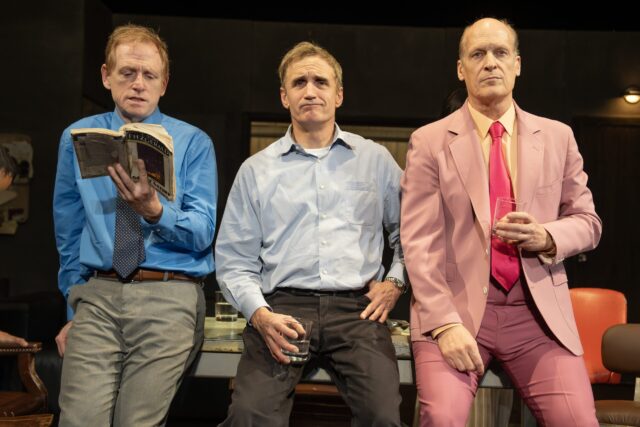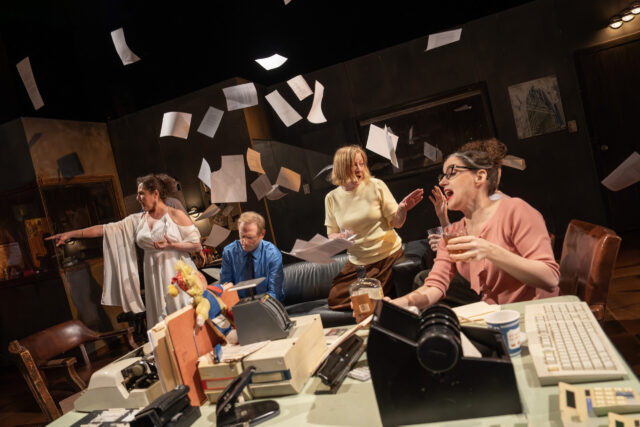
Elevator Repair Service’s Gatz takes place in a ramshackle office (photo by Joan Marcus)
GATZ
Newman Theater, the Public Theater
425 Lafayette St. at Astor Pl.
Tuesday – Sunday through December 1, $210
publictheater.org
www.elevator.org
Elevator Repair Service’s eight-hour Gatz is no mere gimmick, and it’s much more than just a unique theatrical experience; it’s a way of life and a treatise on the human condition.
In 1980, comedian Andy Kaufman began reading F. Scott Fitzgerald’s The Great Gatsby to a university audience that was soon clamoring for him to do almost anything else as it became apparent he was going to read the entire text. ERS founding artistic director John Collins took that to the next level in 2004, creating Gatz, a durational show constructed around every single word of the Great American Novel (other than the chapter numbers). Over twenty years, Gatz has traveled from a Williamsburg garage to locations all over the country and the world, but it didn’t make its official New York City debut until 2010, at the Public, because of rights issues with the Fitzgerald estate. It is now back at the Public’s Newman Theater for a farewell encore presentation through December 1; only a handful of tickets remain.
The play, which consists of four acts, two intermissions, and a ninety-minute dinner break, is set in a somewhat ramshackle, drab office that seems stuck in time, with a long desk cluttered with detritus, a plain brown couch, a glassed-in room in one far corner, high shelves of boxes stuffed with papers, a dusty file cabinet, a booze station, a whiteboard with an employee schedule, a bulletin board with random items pinned to it, a horizontal window revealing a narrow hallway, a fax machine, and a poster of a lion below the declaration: “Stop sharing your income! Start saving taxes with Republic Funds Investment Program.”
An employee (Scott Shepherd) enters, sits at one end of the desk, and turns his DOS computer on and off several times, as it’s not working properly. Another employee (Jim Fletcher) enters, sits down at the other end of the desk, and reads a newspaper before pressing the keys on an old typewriter. Growing bored and frustrated, the first man picks up the 1995 Scribner paperback edition of The Great Gatsby and starts reading it out loud.
“In my younger and more vulnerable years my father gave me some advice that I’ve been turning over in my mind ever since,” he says. “‘Whenever you feel like criticizing anyone,’ he told me, ‘just remember that all the people in this world haven’t had the advantages that you’ve had.’ He didn’t say any more, but we’ve always been unusually communicative in a reserved way, and I understood that he meant a great deal more than that. In consequence, I’m inclined to reserve all judgements, a habit that has opened up many curious natures to me and also made me the victim of not a few veteran bores.” There is nothing boring about Gatz.
At first, his coworkers are confused by what he is doing, but soon they are delivering lines of dialogue themselves — Jay Gatsby (Jim Fletcher), a mysterious, wealthy man who likes to throw parties but keeps a low profile; Daisy Buchanan (Tory Vazquez), Gatsby’s former flame and Nick’s cousin; Tom Buchanan (Pete Simpson), Daisy’s untrustworthy oaf of a husband; Jordan Baker (Susie Sokol), a professional golfer and Daisy’s best friend; George Wilson (Frank Boyd), who runs a local gas station; Myrtle (Laurena Allan), George’s wife, who is having an affair with Tom; Catherine (Annie McNamara), Myrtle’s sister; photographer Chester McKee (Vin Knight) and his wife, Lucille (Maggie Hoffman), who live in the apartment house where Tom has his trysts with Myrtle; Michaelis (sound designer Ben Jalosa Williams), a neighbor of George and Myrtle’s; Ewing Klipspringer (Mike Iveson), a regular Gatsby party guest; Meyer Wolfsheim (Shepherd), Gatsby’s mobbed-up business partner; and Henry C. Gatz (Ross Fletcher), Gatsby’s father.

Nick Carraway (Scott Shepherd), Tom Buchanan (Pete Simpson), and Jay Gatsby (Jim Fletcher) are played by office mates in Gatz (photo by Joan Marcus)
Director Collins includes numerous moments when the world of the book merges with the world of the office while acknowledging that this is a performance being staged in a theater. Phones ring in the office and in the retelling. Employees murmur and whisper to one another in the background as Shepherd keeps reading the novel. Paper is thrown through the air like pages torn from a book. Workers enter and leave just as their Gatsby doppelgängers do. The green light across the Sound that Gatsby is obsessed with is represented by a tiny light on a smoke alarm. Shepherd reads about a motorcycle and the thunderous sounds of a bike shake through the space. In the book, Nick talks about Klipspringer playing the 1920 song “The Love Nest,” and the tune can be heard, including the lyrics, which are not in the book.
At one point, when Gatsby’s hair is mentioned, both Fletcher, who is bald, and Shepherd do a double take and mug for the audience, a move that emphasizes that even while the production is being faithful to the novel by pronouncing every word, there is still plenty open to interpretation; after all, people read the same book but don’t see the exact same things in their imagination. Thus, when a child in the book says, “Aunt Jordan’s got on a white dress too,” we are not taken aback that the character in fact is not wearing a white dress; however, we are dazzled when Nick says, “I hadn’t gone twenty yards when I heard my name and Gatsby stepped from between two bushes into the path. I must have felt pretty weird by that time, because I could think of nothing except the luminosity of his pink suit under the moon,” and Fletcher appears in a luminous pink suit. As a bonus, Gatsby’s father — a part that is often left out — is played by his real-life dad, Dr. Fletcher, who has performed the role since 2005. (The costumes are by Colleen Werthmann, with original scenic design by Louisa Thompson and soft lighting by Mark Barton.)
The cast is extraordinary in morphing between office drones and Gatsby characters: Simpson is a hulking, primal Tom, tossing around mail like he treats his wife; Vazquez infuses Daisy with a strong sense of conviction; Sokol excels as an efficient employee and Baker, who knows exactly what she wants and how to get it; and Williams ably marks the past and the present, not only portraying Michaelis but also operating the sound from a desk at front stage right, complete with a laptop that is a regular reminder that this is a show we are watching in 2024, even if the book takes place in the 1920s and the office hijinks occur in the 1980s.
Fletcher, one of New York City’s most adventurous and engaging actors, gives us a Gatsby we’ve never seen before, one that is more memorable than Robert Redford’s in Jack Clayton’s static 1974 film and Leonardo DiCaprio’s in Baz Luhrmann’s glitzy 3-D 2013 extravaganza. A veteran of ERS, the Wooster Group, and NYC Players, Fletcher brings his trademark deadpan style to the role; he is tall and sturdy, imbuing Gatsby with a touching vulnerability that is at odds with his steadfast office worker.

Mayhem ensues when a mundane office starts merging with The Great Gatsby (photo by Joan Marcus)
After all, despite his name being in the title of the book, the protagonist of The Great Gatsby is not Jay but Nick, who is telling the story. Shepherd originated the role of Carraway, and his performance is one of remarkable depth and substance. Although the paperback is in his hands for nearly the entire show, he actually knows the book by heart, but it is not basic recitation. He understands every word, every line, every plot twist, bringing an intoxicating nuance to the story while not drastically altering the tone of his voice. In the fourth and final act, I felt a twinge of sadness as I saw the remaining pages dwindle, knowing the end was coming. Gatz is like nothing I’ve ever experienced before; I now understand why so many friends and colleagues have seen it multiple times. It might last the length of an average American work day, but its marvelous pacing makes it fly by — yet in one of the show’s many clever touches, the clock on the desk never advances a second.
Given that the novel is now in the public domain, there are likely more Gatsbys to come, following this year’s disappointing Broadway musical and last year’s immersive, participatory show in addition to Rachel Chavkin’s musical adaptation that ran this summer at the American Repertory Theater at Harvard. It’s a shame that Gatz, which explores the drudgery of everyday life alongside the fictional, fantastical domain Gatsby tries to construct around him, will never be performed again in New York City, that more people will not be able revel in this one-of-a-kind interpretation, an American classic all its own.
The last word, of course, will be Fitzgerald’s:
“Gatsby believed in the green light, the orgiastic future that year by year recedes before us. It eluded us then, but that’s no matter — tomorrow we will run faster, stretch out our arms further. . . . And one fine morning —
“So we beat on, boats against the current, borne back ceaselessly into the past.”
[Mark Rifkin is a Brooklyn-born, Manhattan-based writer and editor; you can follow him on Substack here.]